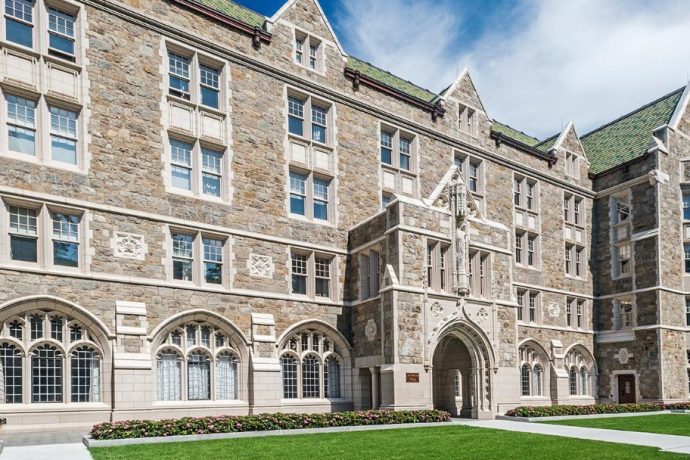- There is a thirst for both humanistic and interdisciplinary approaches to problems. Both students and faculty have become less niche, and students in the sciences want to engage a different part of themselves in thinking about the work they intend to do. Creative assignments and discussion-based courses are a major draw.
- Avoid territoriality. There is usually room for more than one kind of program. In 2019, BC instituted a major and minor in Global Public Health, which is less humanistic and more pre-professional. Although some might have seen this as a threat to the Medical Humanities minor, the relationship between the two programs has instead been collegial and collaborative, which has benefited both programs and their students.
- Reach out to other units early on in program development and think about the process as collaborative. The four program development lunches in the first year were foundational and laid the groundwork for how everyone would work together to create a realistic and sustainable program.
- Consider sustainability from the get-go. A program must have multiple stewards to survive and thrive in the long term.
Boston College’s Medical Humanities Minor

For the last ten years, Boston College (BC) has offered a minor in Medical Humanities. The majority of the students in the minor are not humanities majors; rather, they are often pre-med or majoring in a different STEMM (Science, Technology, Engineering, Math, and Medicine) field; some of them might have liked to major in the humanities but did not, for various reasons. Nevertheless, says Professor Amy Boesky, who helped found the program and still leads it today, the students who complete the minor come out of it strongly committed to the humanities as a lens and way of thinking about their work.
The initial team that designed the minor was strongly interdisciplinary, including 15-18 faculty members from such fields as sociology, economics, theology (where students can also find faculty who work on bioethics), nursing, history, biology, and English. Boesky applied for a small internal grant that allowed her to bring everyone together four times throughout the initial year for a series of program development lunches. From the outset, the team realized that the minor would need to be flexible. BC has a very large core curriculum, and much of students’ first two years are taken up with foundational courses, regardless of their major; furthermore, only one course may be counted for two requirements. They needed to create a program that was both manageable and substantive.
All Medical Humanities minors enroll in the core course, Introduction to Medical Humanities, offered through the English department. This course is very popular, and not only with students who pursue the Medical Humanities minor. The department typically offers four sections of it per year, each with 25 students, and could probably offer more because of interest from pre-med students, who are encouraged to take an additional English course before applying to medical school.
For advising purposes, many students choose an unofficial concentration in one of five areas: Global/Public Health, Values and Ethics, Mind and Body, Health Care Delivery, or Medical Narrative, Writing, and Representation. In addition to the introductory course, students must take five additional courses across at least three disciplines. One of those courses must be an “advanced elective”––that is, it must be either upper division or writing intensive. All courses must contain at least 30% material focused on human health in order to count. Examples of elective courses include:
- Genomics and Personalized Medicine (Biology)
- Ancient Medicine (Classics)
- Public Policy in an Aging Society (Economics)
- Writing for Health and Medicine (English)
- Drugs and Money (History)
- Comparing Health Care Systems through a Global Lens (Nursing)
- Poverty and Neurodevelopment (Psychology)
- Sociology of Health and Illness (Sociology)
To keep an eye on numbers––and to encourage student commitment––students are required to apply for the minor. Enrollment is capped at 50-60 students per year, which allows for a strong culture of advising. Boesky notes that the students––many of whom are accustomed to large lecture classes in their major fields––appreciate the chance to talk small, discussion-based courses, and assignments that allow them to bring the creative and intellectual parts of themselves together. Since COVID, the minor has seen an influx of students who are interested in social justice and in thinking about how to fix a broken healthcare system. They are eager to read narratives and think deeply and critically about the concept of care.
Many of these themes and concerns are reflected in the student-run journal, Medical Humanities Journal of Boston College. Run entirely by students, the journal provides an opportunity for them to practice their humanities skills, no matter their major. A speaker series affiliated with the minor has also been transformative for some students, as speakers drive home the idea that writing can make a difference, whether through health policy/law, traditional medicine, or working for an NGO.
Now a decade old, the Medical Humanities minor at BC is thriving. Boesky hopes that the minor will continue to draw students, particularly as new pressures and new technologies, such as the rise of AI, emphasize the value of what is uniquely human. The purpose of something like a minor in medical humanities is not only about preventing doctors from burning out, but about re-centering the human––and humanity–– in health care.

